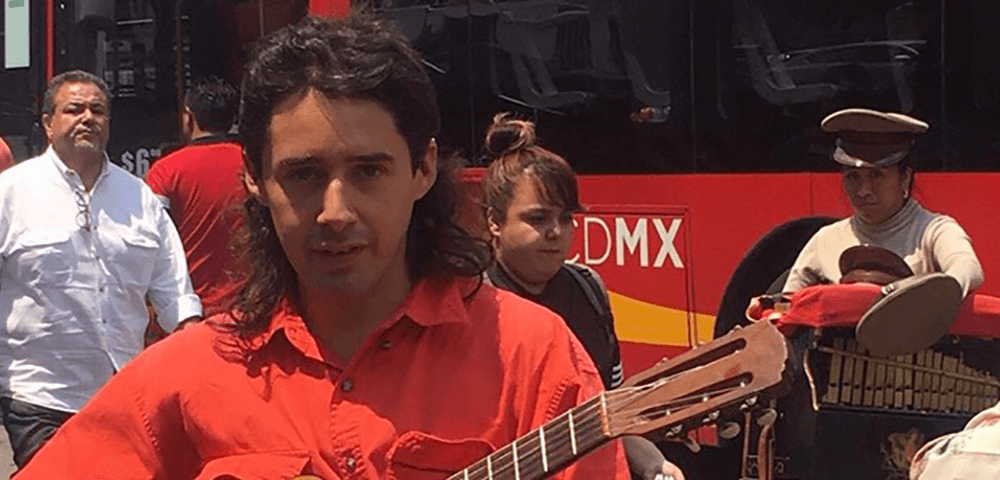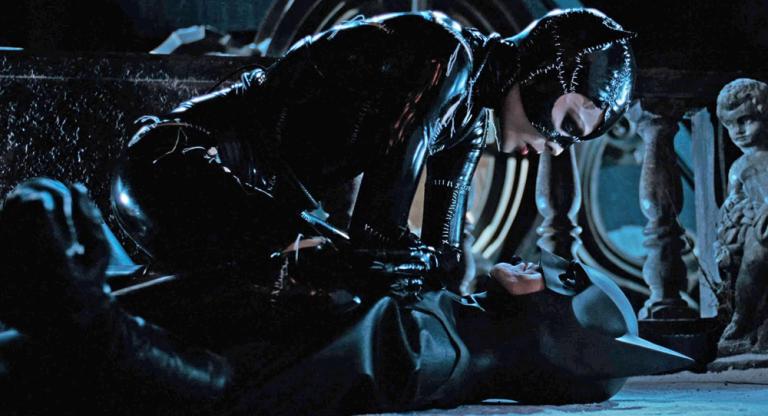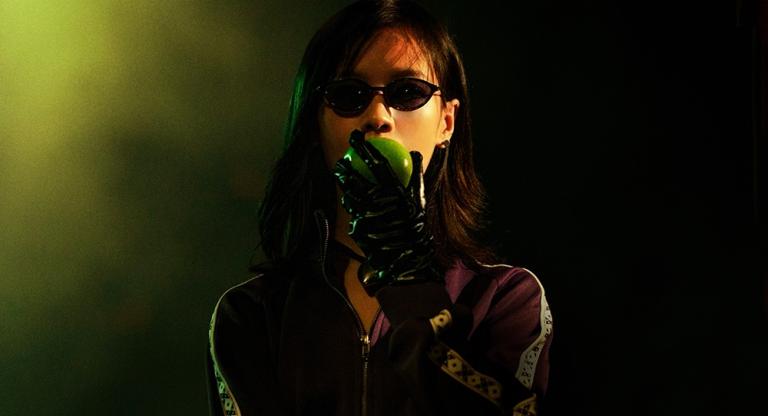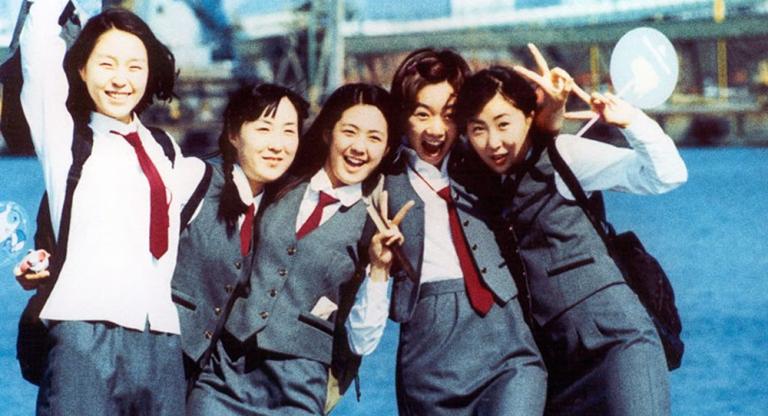On a hot summer Memorial Day I spent time with Juan Wauters on a glitchy WhatsApp phone call. We talked about his upcoming screening at Spectacle on July 13, in which a selection of his video works will show along with Q&As with Sadie Benning and Owen Kline.
As cliché as it sounds, speaking with Juan is like talking to an old friend. His voice is soothing, the topics zigzag, and he’s accessible and unguarded. Those who live far from home recognize that voice and the experience of transferring an understanding with a distant other through radio frequency. You often see people in a city taking strolls, talking to far-flung beings through their earphones, verbalizing fantasies, recent accomplishments, escapades, and agonies, while simultaneously broadcasting their existences onto fugitive neighborhood ears. Wandering about has a special way of tapping into the unconscious and accessing the self, much like going to the cinema.
Juan started experimenting with video in 2016 while on tour. These video portraits capture the touring musician’s experience. Throughout our conversation, we hit upon the subject of people-watching as a practice.
JW: I like to see people. I don't know about you, but with my friends in my neighborhood, a lot of times we just sit down and people-watch. Sometimes, I look at people and I wonder what their life is like, you know? Just by looking at them, I'm drawn to them. Then I wonder what type of lifestyle people live. Especially if you look at a place like Union Square. Let's say that you go every day, and there's always the same people hanging out in the square you like. How come they have all this time to enjoy this square? I guess then, with the camera, I do the same. I wish I could do it without people noticing but I know, people have privacy, and so... [laughs]
We start talking about Romane, Juin 2016,a glitchy video portrait of a young postal service worker living in a village in France. Romane is sensitive, but assertive, and beautiful, the anti-Bukowski. She burps, smokes, smiles at the camera, and plays Bob Marley covers on the guitar. She’s collaged with images of fuchsia roses, the color of which smears and spills over into other areas in the picture creating an unintentional, trippy video artifact.
JW: We became friends when I was hanging out in her small village with her family. And then one day I went to her job with her to deliver the letters. I filmed her day to day without much directing. The first day I went without the camera, and I was not thinking about filming, but I liked it so much, I said, “Hey, can I film this?” And she said yes.
I ask about his production process and what originally motivated him to pick up a camera.
JW: My really good friend, who's been very inspirational in my life in New York. He's been a creative partner for as long as I can remember, in my life in New York. His name is Matthew Volz. We had friends in common that went to high school together. That's how we met. He he was more into filming, so he made a lot of other videos for the band they had. He also made a lot of music videos for my music project, under my name. I'm comfortable being a subject for his films and contributing on the output. And so there's always been a camera around that way. I learned how to use the camera like that. Then, one time his camera broke, and I had money at the time, so I bought the same camera. I bought it for us. I mean, he had plenty of time and I had money at the time. So sometimes I would use it, and then we started making videos. Later we started making videos in which we used the footage he got plus footage I got.
We made them with a Panasonic DV 8100, but now I have a better camera. I really like how The Godfather looks. So I'd like to recreate that type of look, with depth of field focusing, a little bit of natural light. The microphone is already built in and everything is built in. And then I didn't know how to edit with a computer. But, what I would do… I would watch the movie with an RCA cable and point out to a TV. I would plug it on a TV and my TV was connected to a VCR and I would edit it on the VCR. Like, just recording the parts that I wanted and I went in from the beginning until the end . The Romane movie is built. The narrative I created after, when I edited it. It's built as if it was one day. When she introduces herself, we'reon a rooftop and she introduces herself, then we go to deliver the letters and then it ends with the song.So it's like a whole full day but it happens over a couple of days. So I had to edit it . So, first I would have recorded onto a VHS. I would record whatever I wanted to record, then I would record whatever followed. So I made the order like that. That's why it had so many glitches. Again, It's not something that I was looking for exactly, that texture to the image. It looks a little wasted. But then, I didn't mind it at the time. The texture of the image came with the process. I don't mind that look that much. I even find it a little bit, I don't know, cozy. It has glitches, so it feels kind of like, a home video.
Language is a recurring theme in Juan’s body of work and it’s especially apparent in Romane. In the video, the French language dialogues are left un-subtitled. Romane communicates gesturally with the camera, offering coy, suggestive looks. Our bodies fill in the gaps of verbal communication, of what is left unsaid or what cannot be said because we lack the words, the untranslatable, unspoken. Desire can be communicated through gazing eyes across a room, like an engrossing subthread subject to interpretation.
JW: One other thing I liked about this film [is that] it took place in a small village. They definitely do not speak English or Spanish. I don't know French, much. I mean, I had been there for a couple of weeks or months at the time so I really picked up some of it, because I know Spanish, and it's similar. So, she did not know English either. She knew a little English, and I knew a little French, and we communicated like that. But, I thought I really liked it, and you may not understand it a 100% of it, and that made me like it even more. It feels really mysterious. You don't know what she's talking about. But she's very communicative with her face and her body. So I wanted to preserve the natural language for the film. And if you know French you understand it, and if you don't know French, then it's a little bit more mysterious, but, there's something that you'll understand too, I guess.
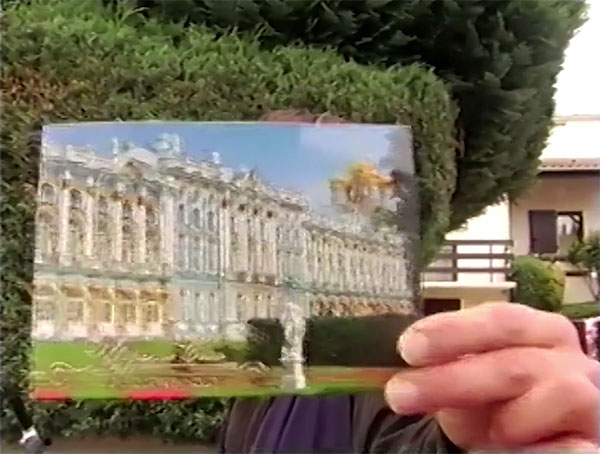
We talk about the impulse to, in my words, immortalize people, by recording them. “To preserve moments in time” (his words) as an ultimate act of love and veneration (my words).
JW: Mostly, I love people acting normal. In the end, I don't know...I want to preserve it in time, just because I think it looks good to me and I like to keep it. Preserving time...I think that's why people film, right? At the same time. It's all experimental up until today. And since it gives me some sort of pleasure to make them [these videos] and to watch them. I like to show it but... I'm not in the field. I'm not... I'm not a movie-maker, I didn't study film. I'm not...part of any scene. I don't know what filmmakers talk about, I don't know what filmmakers like. So, In a way this is like an experiment for me to show it as well because I like to have a conversation with these types of people. I'll see what people think about my movies and stuff. For me it's just a pleasure to make it and watch it.
Homecomings can be a deceptive set of mirrors. A place you once left is never the same when you return. But there is a comfort and reassurance in community and shared language, something that invariably eludes immigrants. Another video screening tonight, Bolero Uruguay, captures that longing, an unfulfilled or fleetingly fulfilled promise of fulfillment — like an Osprey and a plane intersecting briefly in the sky, before proceeding in opposite directions.
JW: I came to New York from Uruguay as a teenager, because my family decided to come to New York. They moved all of us together to Queens. It was not really my decision at the time. And it hurt, but it also enriched me, because I was exposed to other things in a very critical time in my life. I was very vulnerable and I felt like being exposed to New York at such a young age encouraged me to create myself. I mean, you live there too so you must know. In New York they encourage us to be ourselves, or that's how I felt growing up there. You were supposed to be you and if you were you, then it's all good. Nobody's going to judge you. I mean, yeah there's racism and classism, and there are different ways that they look at all of us. But, generally It's not that bad compared to other places. I loved that I was able to express myself. And judgment was part of the process.
But there's so many people out there that if there's a lot of people that don't like what you do, there'll be some people that like what you do. So, that was always encouraging for me to try to explore my expression. Like, say what I want to say, what I wanted to say, the way I want to say it and not find people making fun of you or judging you for being. People are too busy to be talking about you before going to work already. They don't have time to get distracted by what you're doing. So you find some kind of comfort in that. I felt some. It’s what helped me cope with this isolation that comes from being from another country.
[Bolero, Uruguay] was close to the time when I spent my birthday in a in Uruguay way for the first time after leaving. I thought it was kind of kind of a spiritual connection with my family and my history to celebrate the day... Well, on our birthday we celebrate our life we celebrate another year being alive. So it was really important for me. I don't know. It was very emotional to be in Uruguay again for my birthday, the day I had been born in that place. I hasn’t happened again. So, during that time I filmed all the people in places where I would hang out. [The location is] right across the street from where I grew up, we grew up. Right now it's different, because I lived there in the 90s.
I wanted to glorify that moment too, how I glorified those people that I told you too, like Romane and Cristian. These are people and places that I hold really close to my heart. So in a way I'm showing... I feel like I was very touched with my history at the time because I was spending my birthday in my homeland for the first time after, I think, 17 years. And I was filming things that were important to me. I think that's what they film is about. I mean, the song (“Bolero” by Maurice Ravel) I really liked because I grew up listening to that song and I love the...repetition in any sort of expression. I like repetition. How it becomes soothing. How after sometime, you stop thinking about in a way, because ... It becomes part of the... you've heard it so much that it is already in you. I love that about Puerto Rican music, by the way.
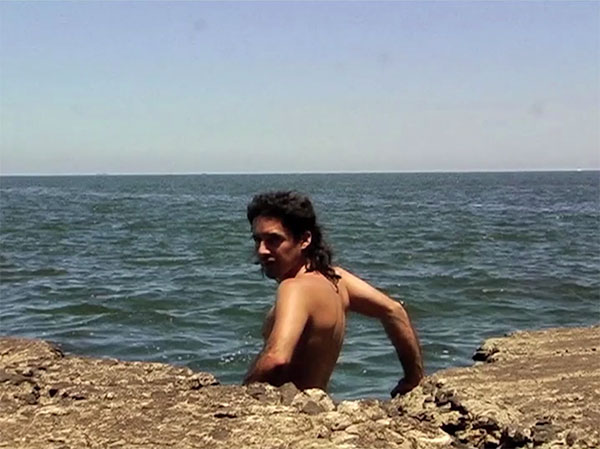
Because he travels so much, and traveling is an essential component of his work, especially his new album La Onda de Juan, I ask if Jackson Heights is where his home is.
JW: Yeah. It was, up until recently. I never doubted that. Because like I said, I had my New York City life before, but now especially since that day I told you that I spent my birthday in Uruguay and it was very emotional. It made me question certain things.
Being in Puerto Rico, like in Mexico, is where I felt like at home the most, maybe because there's a lot of Puerto Ricans in New York and I love Mexico. I came to Puerto Rico and I really felt like I had been there already. [laughs] Same in Mexico. I even thought about moving to these places. Because I travel a lot, when I am not traveling I like to spend time with my family, and they live in Queens, so I make an effort to go there.
Sometimes I think I want to leave, but it always drags me back. I haven't been able to leave New York yet. I feel like, it's like a drug addiction being in New York
CG: Because of the intensity?
JW:The type of feeling, because I love to work in New York. So I feel like when I go to other places, my intensity? Yeah. The amount of things I want to do in one take is way more than, like, many, many, many, many, people around the world who would just like to relax. I'm trying to understand that there's a possibility to relax. I don't really Know how to relax. [laughs] So in a way, I'm trying to understand that. And maybe one day I can move from New York. But, I also like that intensity.
CG: You can use it.
JW: But, What? Why? What is it for?
Maybe we can access an explanation to “what is it for?” by closing our eyes and observing the visual patterns that come to sight (a phenomenon known as Phosphenes or Prisoner's Cinema) on a crowded metro in Mexico City, on a Cinema in New York, by flying a kite in India, on a fall in Uruguay, or on a beach in Puerto Rico.
